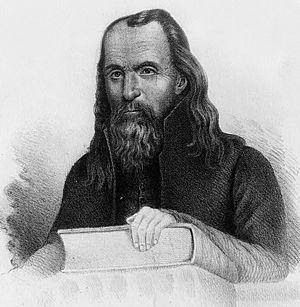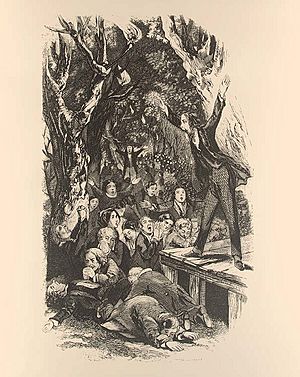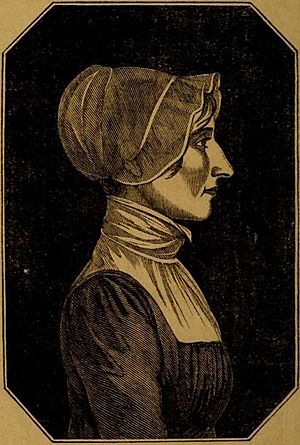Lorenzo Dow facts for kids
Lorenzo Dow (born October 16, 1777 – died February 2, 1834) was a very unusual and popular American preacher. He traveled all over the country, sharing his religious messages. Many people say he spoke to more individuals than any other preacher of his time. He was also a well-known writer. His life story, called an autobiography, was once the second best-selling book in the United States. Only the Bible sold more copies.
Contents
Early Life and Calling
Lorenzo Dow was born in Coventry, Connecticut. His parents were Humphrey and Tabitha Parker Dow. As a child, Lorenzo was often sick. He thought a lot about religion when he was young. Eventually, he decided to join the Methodist faith.
In 1796, he tried to become a preacher in Connecticut but was not accepted. Two years later, in 1798, he was finally allowed to become a preacher. His family did not agree with his choice. He started as a traveling preacher in New York. He moved to different places like Pittsfield, Massachusetts and Essex, Vermont.
Traveling the World to Preach
Lorenzo Dow felt a special calling to preach. He traveled across the Atlantic Ocean to Ireland and England. He visited these countries three times: in 1799, 1805, and 1818. His unique style and powerful speeches attracted huge crowds.
He wanted to preach to Catholics in Ireland. After this, he was no longer officially part of the Methodist Church. However, his beliefs remained very similar to Methodism. He even helped start "camp meetings" in England. These were large outdoor religious gatherings. The arguments about these meetings led to the creation of the Primitive Methodist Society.
In 1802, he preached in Albany, New York. He spoke against ideas like atheism (not believing in God) and deism (believing God created the world but doesn't interfere). In 1803 and 1804, he traveled to the Mississippi Territory. This area is now the states of Mississippi and Alabama. He gave the first Protestant sermon there. There is a rock in Georgia with a plaque. It says that Lorenzo Dow preached the first "Gospel sermon" in Jasper County on that rock in 1803. By 1807, he was also preaching in the Louisiana Territory.
Dow's Unique Preaching Style
Lorenzo Dow was very enthusiastic. He preached for over 30 years across almost all of the United States. Later in his life, he often spoke out against the Jesuits and Roman Catholicism.
People in America and Britain came in large numbers to hear him. He was admired by many, but also sometimes treated badly. Since churches often would not let him speak, he preached in town halls, barns, and even open fields. He would preach anywhere he could gather a crowd. He spoke to people of all faiths, including Methodists, Baptists, Quakers, Catholics, and even atheists.
He had a special way of announcing his sermons. He would appear unexpectedly at public events. He would loudly declare that exactly one year from that day, he would preach in the same spot. He always kept his promise. He would return exactly 365 days later. Huge crowds would usually be waiting for him.
Dow's way of speaking was very different from other preachers. He would shout, scream, cry, and beg. He would flatter people and sometimes even insult their beliefs. He told stories and made jokes. It is said that Lorenzo Dow often preached to outdoor crowds of 10,000 people or more. He kept them completely focused on his words.
Life as a Traveling Preacher
As Lorenzo Dow's fame grew, so did his travels. He walked most places, sometimes riding a horse if someone gave him one. His wife, Peggy Dow, sometimes traveled with him. He went to Canada, England, Ireland, and even the West Indies. Most people welcomed him, but not everyone.
Lorenzo Dow strongly believed that slavery should end. This made his sermons unpopular in the southern United States. He was often threatened with violence. Sometimes, people would force him out of towns. They would throw stones, eggs, and rotten vegetables at him. This happened in Jacksonborough, Georgia, around 1820. But this never stopped him. He would simply walk to the next town and give the same sermon again.
Lorenzo Dow did not care much about his appearance. He was described as messy. His long hair and beard looked like they had "never met a comb." He usually owned only one set of clothes, the ones he was wearing. When his clothes became too old and torn, someone in the audience would usually give him new ones. These donated clothes often did not fit his thin body.
When he traveled, he carried no luggage. He only had a box of Bibles to give away. For most of his life, any money he received was given to the poor or used to buy more Bibles. Later in life, he earned some money from selling his autobiography and other religious writings. His unusual manners and clothes sometimes made people not like him. This could reduce the effect of his powerful speeches. Still, it is believed he preached to more people than anyone else at that time.
Later Years and Legacy
Lorenzo Dow died in Georgetown, Washington, D.C. in 1834. He was 56 years old and had been ill. His friend, George Haller, took care of him. Before he died, Dow asked that his old greatcoat be used to wrap his body. He was buried at Holmead's Burying Ground. He chose his own words for his gravestone:
A Christian is the highest style of man;
He is a slave to no sect, takes no private road,
But looks through nature up to nature's God.
In 1887, Holmead's cemetery was closing. A man named William Wilson Corcoran paid to have Dow's body moved. He was reburied at Oak Hill Cemetery near Georgetown.
Lorenzo Dow was so popular that many children born in the early 1800s were named after him. This was especially true on the American frontier. His autobiography became a bestseller. The 1850 U.S. Census shows that Lorenzo was one of the most popular first names in America.
Family Life
Lorenzo Dow's wife was Peggy Dow (1780–1820). She was almost as unique as her husband. She wrote her own journal, which was published in 1833. It was called Vicissitudes in the Wilderness.
Selected Writings
- Polemical Works (1814)
- The Stranger in Charleston, or the Trial and Confession of Lorenzo Dow (1822)
- A Short Account of a Long Travel; with Beauties of Wesley (1823)
- History of a Cosmopolite; or the Four Volumes of the Rev. Lorenzo Dow's Journal, concentrated in One, containing his Experience and Travels from Childhood to 1814 (1814; many later editions); this volume also contains "All the Polemical Works of Lorenzo." The edition of 1854 was entitled The Dealings of God, Man, and the Devil as exemplified in the Life, Experience and Travels of Lorenzo Dow.
 | James Van Der Zee |
 | Alma Thomas |
 | Ellis Wilson |
 | Margaret Taylor-Burroughs |




